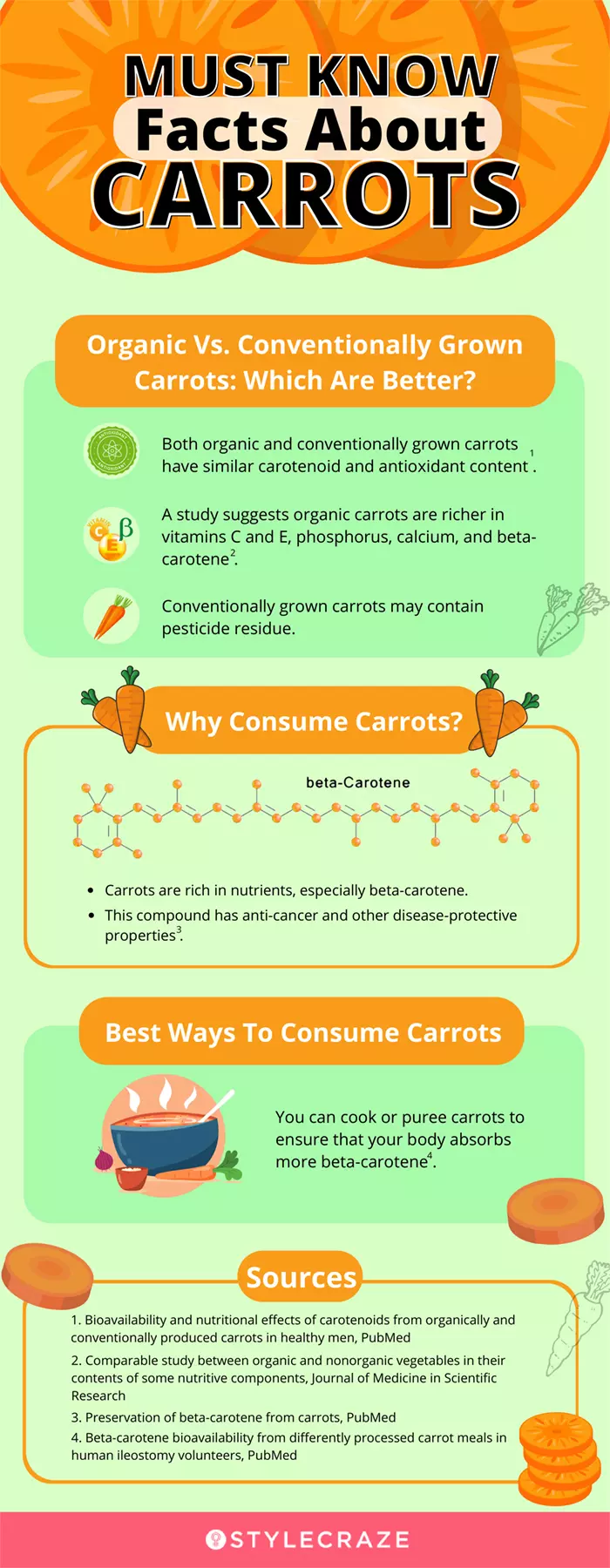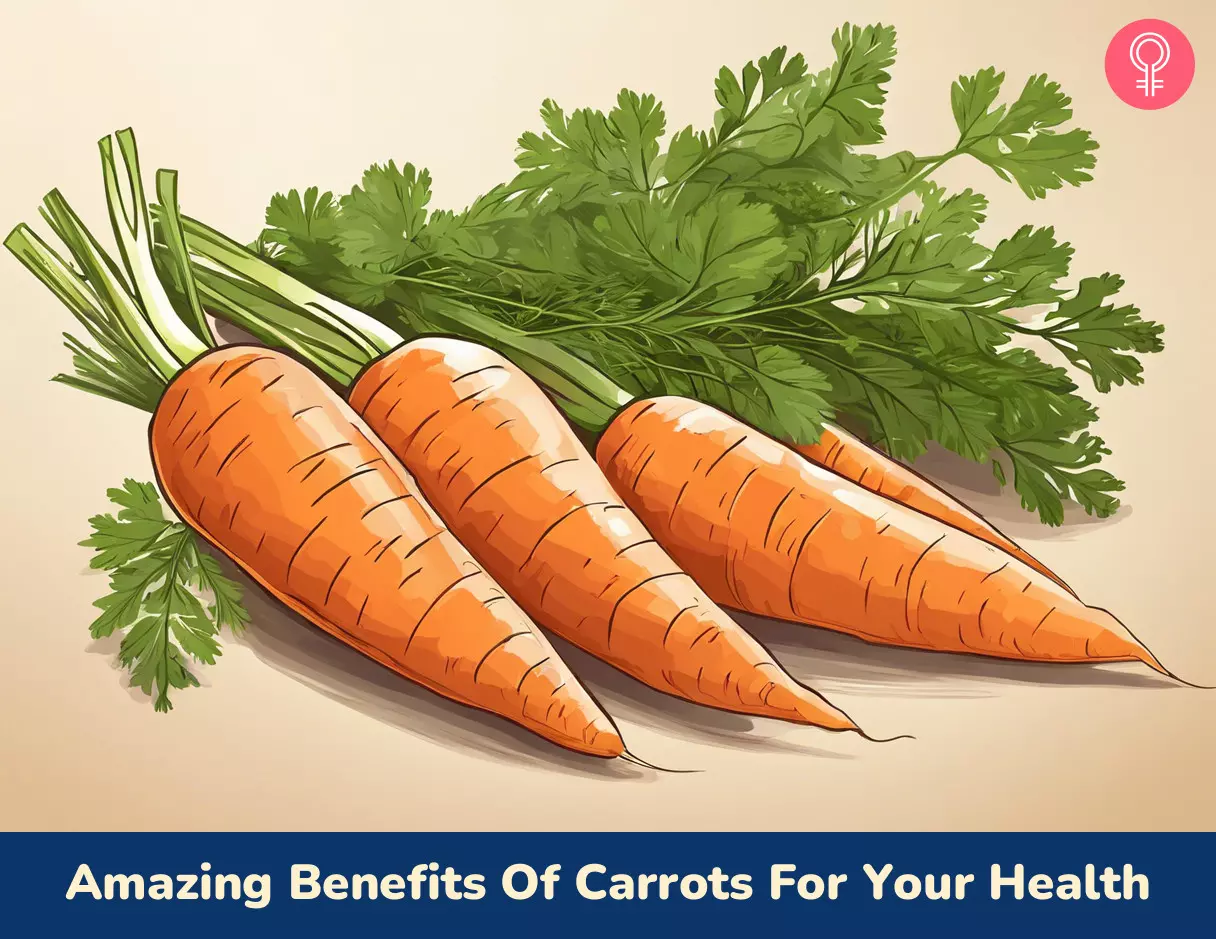Learn about the other carrot benefits, uses of carrots, and the potential side effects of their overconsumption. Read on.
A Brief On Carrots
People have been eating carrots for over 5,000 years. The vegetable originated in the Middle East and Afghanistan and was initially available only in purple and yellow colors. The familiar orange carrot was developed only later, in the 1600s. Who Can Use It? It is safe for everyone, except those with carrot allergies. Individuals with diabetes are advised to include this. How Often? You may consume 1 to 2 carrots as part of your daily diet. Caution Eating excessive amounts of carrots may cause skin discoloration, and individuals with carrot allergies should avoid consuming them.
What Are The Health Benefits Of Eating Carrots?
1. May Promote Eye Health
Vitamin A, in recommended quantities, is essential for good vision and sharp eyesight, and carrots offer the nutrient in abundance. If a person is deprived of vitamin A for too long, the outer segments of the eyes’ photoreceptorsi Retinal cells that convert light into electrical signals, which the brain interprets as sight and allows us to experience color. begin to deteriorate. This leads to night blindness (2). Insufficient vitamin A can disrupt the normal chemical processes involved in vision. Restoring adequate vitamin A intake can facilitate vision health (3).
2. May Reduce Risk Of Cancer
A study investigated the risk of Colorectal Cancer amongst 160,725 individuals. In total, 1889 (3.38%) were diagnosed with Colorectal Cancer risk (CRC) during the first follow-up. The resulting incidence of CRC was 3.9% for those eating no raw carrots, 3.5% for those eating less than 32 g of carrots per day, and 2.9% for those eating more than 32 g of carrots per day. The results indicated a positive relationship between the consumption of carrots and reduced colorectal cancer risk. Carrots contain numerous phytochemicalsi Beneficial compounds found in plant-based foods that may reduce the risk of certain chronic diseases, such as cancer. that are well-studied for their anticancer properties (4). A few of these compounds include beta-carotene and other carotenoids. These compounds promote immunity and activate certain proteins that inhibit cancer cells. Studies show that the juice from carrots can combat leukemia as well (5). The carotenoids present in carrots may reduce the risk of stomach, colon, prostate, lung, and breast cancers in women (6), (7), (8), (9). Some believe carrots may also reduce oral cancer risk. However, more research is warranted in this regard.
3. May Promote Skin Health
Carrot benefits for the skin are uncountable. Carrots are rich in carotenoids. Research suggests that fruits and vegetables rich in these compounds can improve skin appearance and also help people look relatively younger (10). However, overconsuming carrots (or other foods high in carotenoids) can result in a condition called carotenemia, wherein your skin appears yellow or orange (11).
4. May Enhance Hair Growth
Carrots are powerhouses of vitamins A and C, carotenoids, potassium, and other antioxidants. Anecdotal evidence suggests that consuming carrots for hair growth may leave you with healthy-looking hair. However, more research is needed in this regard.
5. May Aid Weight Loss
Raw, fresh carrots are about 88% water (1). A medium carrot has only about 25 calories. Hence, including carrots in your diet is a smart way of filling yourself up without piling on calories and consuming immense nutrition as well. Carrots also contain fiber. In a study, meals containing whole and blended carrots resulted in higher satiety levels in the test subjects (12).
6. May Regulate Blood Pressure
One study claimed that carrot juice contributed to a 5% reduction in systolic blood pressure. The nutrients present in carrot juice benefit people with high blood pressure levels. It contains fiber, potassium, nitrates, and vitamin C, which were found to aid this effect (13).
7. May Aid Diabetes Treatment
Following a healthy, balanced diet and maintaining healthy weight can reduce the risk of type 2 diabetes. In studies, low blood levels of vitamin A were found in individuals with diabetes. The abnormalities in glucose metabolism would need an increased need to fight oxidative stress, and this is where the antioxidant vitamin A may help (14). Carrots are high in fiber. Studies show that increased fiber intake can improve glucose metabolism in individuals with diabetes (15). The veggies can be added to a diabetes meal, to maintain blood sugar levels.
8. May Boost Immunity
Vitamin A regulates the functioning of your system and prevents infections. It achieves this by boosting your body’s immunity (16). Get this immune-boosting vitamin from carrots. Carrots also contain vitamin C which contributes to the production of collagen, which is essential for wound healing. This nutrient further contributes to a strong immune system (17). Mayra Gianira, a vlogger, spoke about the benefits of drinking carrot juice for 7 days in her video. She said, “When I get a paper cut; within like two hours, it’s fully healed (i).”
9. May Strengthen Bones
Vitamin A influences bone cell metabolism. Carotenoids are associated with improved bone health (18). Though there is no direct research stating that carrots can help improve bone health, their vitamin A content may help. More studies are needed to further understand this mechanism.
10. May Lower Cholesterol Levels
As per rat studies, carrot consumption can reduce cholesterol absorption and increase the antioxidant status of your body. These effects can also promote cardiovascular health (19). Raw carrots are also rich in a fiber called pectin that may help lower cholesterol (20).
11. Are Good For The Teeth And Gums
Chewing of carrots may promote oral cleanliness (21). Some believe carrots may also freshen breath, though there is no research to substantiate the statement. Anecdotal evidence suggests that carrots may neutralize the citric and malic acids usually left behind in your mouth, promoting oral health.
12. May Promote Liver Health And Eliminate Toxins
Carrots contain glutathione. The antioxidant was found to have the potential to treat liver damage caused by oxidative stress (22). The veggies are also high in plant flavonoidsi Naturally occurring compounds with antioxidant properties that help protect against toxins and reduce the risk of certain illnesses. and beta-carotene, both of which stimulate and support your overall liver function. The beta-carotene benefits that carrots offer may also combat liver diseases (23).
13. May Help Treat PCOS
Carrots are non-starchy veggies with a low glycemic indexi A rating describing the ability of foods to get absorbed slowly into the bloodstream, resulting in a slower rise in blood sugar levels. . These properties may make them a good treatment for PCOS. However, there is no direct research that states that carrots can help in PCOS treatment. These are the multiple ways carrots can benefit you. We saw a few of the powerful nutrients in carrots. In the following section, we will look at their complete nutritional profile.
What Is The Nutritional Profile Of Carrots?
Source: USDA Carrots contain beta-carotene and alpha-carotene – two carotenoids that our bodies convert to vitamin A. Vitamin A plays a significant role in boosting vision and immune function, maintaining healthy cells, and activating carcinogen-metabolizing enzymes, among other roles. Carrots also contain luteolin, a flavonoid phytochemical that exhibits antioxidant, anti-inflammatory, and anticancer effects (24). They are also great sources of folate, dietary fiber, and several other vitamins and minerals (1).
What Are The Risks Associated With Carrots?
Excess consumption of carrots can be toxic. Carrots may interact with some medications such as acitretin (Soriatane) and isotretinoin (Accutane) for the treatment of psoriasis and acne (25), (26). People on these medications may be required to limit their intake of carrots. Some people may experience carrot allergies (27). This may trigger swelling and breathing-related issues. Sometimes, it can also lead to anaphylaxis, a severe allergic shock (28). As already discussed, overconsumption of carrots may also cause carotenemia which can cause skin color change. This leads to a yellowish tint on your skin, especially on the palms and soles (11). However, this does not mean you cannot enjoy carrots! When consumed in moderation, they not only offer great benefits but also make for lip-smacking dishes. Check out the next section to learn more about its preparation.
Healthy Carrot Recipe
Ingredients
1.5 cups of sliced carrots 1 tablespoon of honey 2 tablespoons of olive oil Salt and pepper, to taste
How To Prepare Do carrots help your brain? Nilofar Pendhari, a certified clinical nutritionist, says, “Carrots are a great source of beta-carotene (which our body converts to Vitamin A). They reduce the oxidative stress in the brain that helps prevent Alzheimer’s disease, improve memory, and fight cognitive decline.” Are carrots good for the nerves? Pendhari says, “Carrots contain a high amount of the calming nutrient magnesium, which is much needed by the nervous system. Lack of magnesium causes depression, confusion, panic attacks, cramps, muscular tension, and premenstrual syndrome. Carrots are high in vitamin B6 that helps neurotransmitters function by strengthening the entire nervous system.” Can you eat raw carrots every day? Yes, you can. The carotenoids in carrots are converted into vitamin A in the human body. A cup of cooked carrots contains five times the amount of carotenoids you should get in a day. Carrots also provide 3 grams of fiber, which is more than 25% of your daily need (29). How many carrots should I eat per day? The average recommended intake of five servings of various fruits and vegetables on a daily basis contains about 6 to 8 mg of carotenoids. Eating one or two to three carrots a day can be recommended. Also, moderation is key. Consuming more than four carrots a day may cause carotenemia. Can you eat carrot greens? Carrot greens contain significantly higher levels of vitamin C than the root. They also contain potassium, calcium, and protein. Though they can be a little bitter if consumed raw, sautéeing the greens in a little olive oil and salt will soften the harsh flavor. What are the benefits of eating carrots on an empty stomach? Eating carrots on an empty stomach has many health benefits. Some believe it may detoxify the blood, though more research is warranted. Is it good to eat carrots in the morning? Yes. Eating carrots in the morning before a meal is good for health. It may help boost digestion. Also, the fiber in carrots can keep one satiated and prevent overeating. Does carrot whiten skin? Possibly not. While carrots may help boost skin health, there is a lack of evidence suggesting that they may alter melanin production and change the skin tone. Are carrots a superfood? Yes. Carrots are loaded with beneficial micronutrients and pack several health advantages that make them a superfood.
Illustration: Amazing Benefits Of Carrots For Your Health













